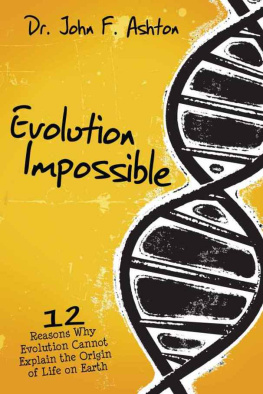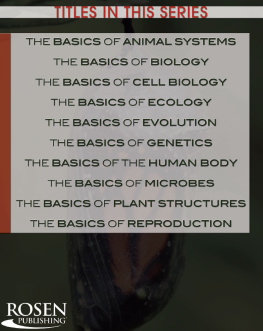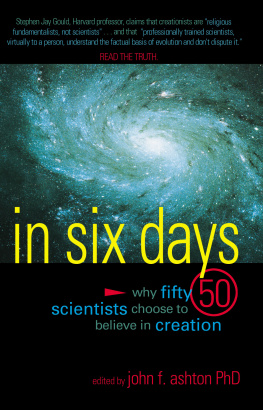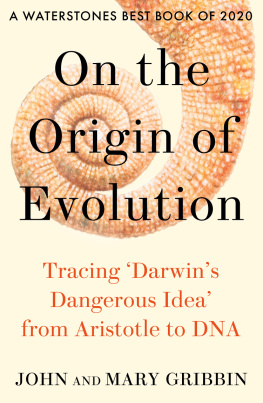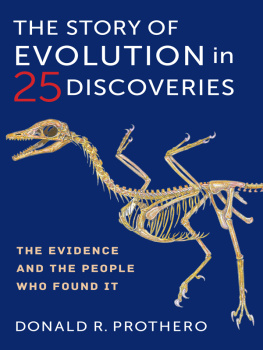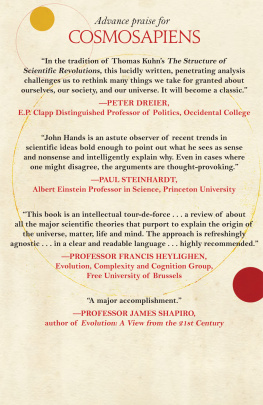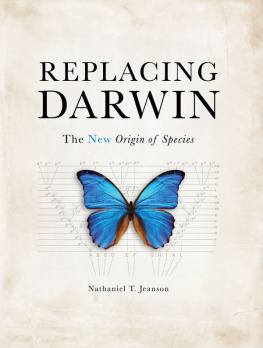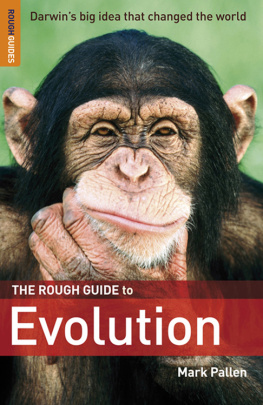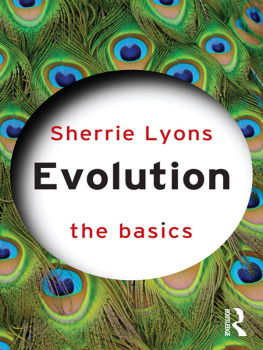Evolution Impossible
12 Reasons Why Evolution Cannot Explain the Origin of Life on Earth
By
Dr. John F. Ashton, PhD
Adjunct Professor of Biomedical Sciences
Victoria University
Melbourne
Adjunct Professor, School of Applied Sciences
RMIT University
Melbourne
Foreword by
Emeritus Professor Warren Grubb, PhD
School of Biomedical Sciences
Curtin University, Perth
In memory of my friend and mentor
Dr. Henry Zuill, PhD,
who believed life is a gift of the Creator
Acknowledgments
I am extremely grateful to Sherrie Courtney, MBBS FRACGP, and Alison Buckley, BA, Dip Ed, Grad Dip Law, B Soc Sci, who gave of their time to read the manuscript and provide helpful comments, and to Warren Grubb, BSc PhD FASM FAAM, who took time to review the book and write the foreword. I also wish to express my appreciation to my wife, Colleen, for her loving encouragement and help with organizing my time to achieve this goal. My thanks also go to Tim Dudley, president of New Leaf Publishing Group, for embracing the book, and to the staff at Master Books for their enthusiasm about the project, which made publishing the book such an enjoyable experience.
First printing: June 2012
Copyright 2012 by John F. Ashton. All rights reserved. No part of this book may be used or reproduced in any manner whatsoever without written permission of the publisher, except in the case of brief quotations in articles and reviews. For information write:
Master Books, P.O. Box 726, Green Forest, AR 72638
Master Books is a division of the New Leaf Publishing Group, Inc.
ISBN: 978-0-89051-681-2
Library of Congress Number: 2012940328
Cover by Diana Bogardus
Please consider requesting that a copy of this volume be purchased by your local library system.
Printed in the United States of America
Please visit our website for other great titles:
www.masterbooks.net
For information regarding author interviews,
please contact the publicity department at (870) 438-5288

Contents
Foreword
T he basis of scientific research is to find the truth, and scientists, of all people, are supposed to have open minds and be willing to look at all the evidence. However, history has told us that once an idea has become entrenched, even scientists find it difficult to accept anything that deviates from this. This is now the case with evolution, and the theory of evolution is now a dogma, or, to quote Professor Bernard David, Darwins Law, and to impugn the theory is ignorance and effrontery (Professor C.D. Darlington).
Having said this, there are open-minded scientists, who, while espousing evolution, are willing to admit that there are difficulties. Dr. John Ashton has highlighted these in his book. While there exists the improbability of life forming spontaneously and mutation and selection explaining how simple life forms evolve into more complex forms, no open-minded person can, in all conscience, elevate the theory of evolution to the law of evolution and be critical of anyone who has the audacity to question the evolutionary process.
If one accepts that there are difficulties with the evolutionary process, then one must look at other interpretations, and Dr. Ashton has proposed alternative interpretations of the evidence. Unfortunately, many people will look at the title of the book and dismiss the book without even opening it. This book is not for those who have already made up their minds but for those who have an open mind and are willing to look at alternative interpretations in their quest for truth. It is to these people that I recommend Dr. Ashtons book.
Emeritus Professor Warren Grubb, PhD
School of Biomedical Sciences, Curtin University,
Perth, Western Australia
.Hugh Montefiore, The Probability of God (London: SCM Press Ltd., 1985), p.75.
Introduction
S ome time ago I was meeting with university professors from a highly regarded Australian university. They were involved in plant breeding research and we were discussing a possible collaborative research project, breeding disease-resistance traits into a newly developed functional cereal grain. The breeding techniques included treating seeds with chemicals that damaged their DNA. The resulting mutant seeds were then germinated and tested for any beneficial traits that might have resulted from the changes.
The new grain cultivar we were discussing possessed a favorable variation due to the destruction of part of a gene. This loss of genetic material meant that the new plant produced a grain with less easily digestible starch. This grain potentially could be made into foods with significant benefits in the prevention and management of type 2 diabetes.
Over lunch I was thinking of the role of mutations in relation to the theory of evolution. For a new species to evolve from a common ancestor, new genetic information must arise presumably from some sort of favorable mutation. So while we were sitting around the lunch table, I asked the research scientist in charge of the plant-breeding project a question. Do mutations ever give rise to new purposeful genetic information?
His answer was immediate. Of course yes!
Can you give me an example? I then asked.
He thought for a moment and replied along the lines of Um, I cant think of a specific example right now but ask our geneticist... he will be able to.
Later that afternoon I caught up with the senior genetics researcher in the university plant-breeding department and asked him the same question.
His reply was just as quick, but the very opposite! Never!
Surprised, I pressed him further. He explained that mutations always lead to damaged DNA, which usually results in the loss of genetic information. He knew of no instances where new purposeful genetic information arose, either by a natural process or through a mutation induced chemically or with radiation.
I thought about these two responses. The older, more experienced scientist believed mutations can produce new purposeful genetic information. And I dare say the other scientists around the lunch table working in related biological fields believed likewise they certainly did not correct the first answer. It seemed likely to me that most scientists who put up their hand for believing in evolution would also agree that mutations can produce new genetic codes, providing new traits for the forces of natural selection to choose from for new species to evolve.
But if the geneticist was correct and mutations never produced new purposeful genetic information, evolution as the cause of life on earth was impossible and could not have happened.
As I thought about this I decided to begin researching and writing this book.
Since the early 1970s, when I was a research fellow in the Department of Chemistry at the University of Tasmania, I have been studying the evidence for evolution. At that time a friend was completing his doctorate in geochemistry. One day he showed me the results from some carbon-14 dating of a specimen of wood from a partly fossilized shovel handle found in the old gold-mining site he was researching. The analysis results from the government laboratory in New Zealand gave an age of 6,600 years. However, the mining activity was from the late 1800s, and it was unlikely that the European shovel handle was made from timber more than a few hundred years old.
This apparently incorrect dating result stimulated my interest in radiometric dating methods, along with the associated implications for the dating of the geological column and evolution. As I continued my research, it seemed to me that evolution had some obvious major problems that were being noted by high-profile scientists such as Sir Fred Hoyle, a well-known British astronomer,
Next page
